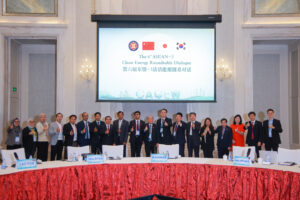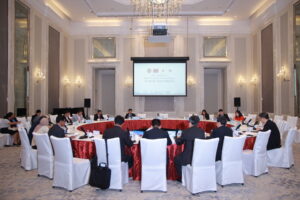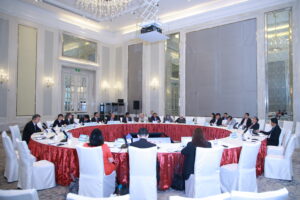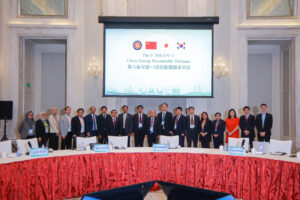Menu

ASEAN+3 (China, Japan, and Republic of Korea) Clean Energy Roundtable Dialogue is an intergovernmental forum that provides the opportunity for experience sharing and cooperation in policy design and technological innovations, particularly in the clean and renewable energy sector. In 2023, the ASEAN+3 (China, Japan, and Republic of Korea) Roundtable Dialogue entered its sixth year and was part of the 2023 China-ASEAN Clean Energy Week (CACEW). Enriching the insightful discussions during CACEW, The 6th Roundtable Dialogue brought forward “Decentralised Power System Development and Consumption” as the theme for the discussion. This session was chaired by Dr. Havidh Nazif, Director of Electricity Business Development, Ministry of Energy and Mineral Resources, Indonesia— and was co-chaired by the representatives of China, Korea, and Cambodia.
The 6th Roundtable Dialogue commenced with the opening remarks from Dr. Havidh Nazif, Director of Electricity Business Development, Ministry of Energy and Mineral Resources, Indonesia, as the roundtable dialogue chair. Mr. Li Chuangjun, the Director General, the Department of New and Renewable Energy, National Energy Administration (NEA) of China, also delivered the opening remark as the programme co-chair. Taking the role of the last deliverer of the opening remark was Dr. Kyungsik Nam, Associate Research Fellow, Korea Energy Economics Institute, who acted as the co-chair. The event was enriched with the special remarks delivered by the co-chair, H.E. Victor Jona, the Vice Minister of Mines and Energy, Cambodia, H.E. Thongphat Inthavong, the Vice Minister of Energy and Mines, Lao PDR, as well as Mr. Beni Suryadi, Manager of Sustainable Energy, Renewable Energy (SRE) Department, ACE.

The first session of the roundtable dialogue was focused on the Observation and Analysis on Decentralised Power System Development and Consumption with keynote presentations delivered by Ms. Nadhilah Shani, Senior Research Analyst of Power, Fossil Fuel, Alternative Energy and Storage (PFS) Department, ASEAN Centre for Energy (ACE) and Mr. Zhang Yiguo, Chief Planning Engineer, China Renewable Energy Engineering Institute (CREEI).
Ms. Nadhilah Shani presented insights on the role and drivers of RE utilisation in the ASEAN Power Grid. In her presentation, Ms. Nadhilah asserted renewable energy’s prominent role in enhancing regional connectivity. Mr. Zhang Yiguo, shared the trajectory and success of renewable energy development with the decentralised power system in China. Towards the end of his presentation, Mr. Zhang Yiguo emphasised the importance of top-level planning and policy guidance for a comprehensive decentralised power system.
Following the conclusion of the first session, the second session brought together the national perspectives of ASEAN+3 through presentations on the strategies, plans and supporting policies of decentralised power development and consumption. Furthermore, the focus of the presentations that the representatives of the ASEAN+3 delivered encompassed the existing policies on power development, the study case of decentralised power systems, and the challenges and opportunities that came with the strategy. The Philippines offered insights on the Net-Metering program, which emancipates electricity end-users to become prosumers by producing their electricity and selling the excess to the grid up to 100 kW. The Singaporean experience of a decentralised energy system was supported by the robust cybersecurity system, which incorporated artificial intelligence and machine learning for network planning and operations.

In the presentation delivered by the representative of Malaysia, one of the highlights was the plant enshrined within the National Energy Transition Roadmap, which aims to expand renewable energy development based on a self-contained system to encourage investment in the RE value chain. The representative of Indonesia brought forward the experience of a decentralised system in an archipelagic setting, with the development of mini/microgrid for remote island communities. The presentation regarding decentralised energy systems delivered by the representative of Cambodia pointed to the development of rural electrification through mini-grid and stand-alone systems. Lastly, Dr. Kyungsik Nam, as the representative of the Republic of Korea, highlighted the comprehensive policy framework and the nationally outlined pathways for developing decentralised and distributed energy resources in the country.
After the presentation, the roundtable dialogue proceeded to the discussions and viewed exchanges from ASEAN Member states regarding the cooperation on the key aspects of decentralised power systems. In addition, the view exchanges focused on developing integrated solutions for the decentralised power and consumption system. The discussants noted the importance of a diversified energy supply and that the higher renewable energy deployment is indispensable for the region’s energy transition pathway. This opportunity faces the challenge of a mismatch between demand and supply location. In circumnavigating this challenge along with addressing the insights during the roundtable discussion, the participants noted the importance of aspects such as;
The 6th Roundtable Discussion was subsequently closed with a remark from Dr. Havidh Nazif, Director of Electricity Business Development, Ministry of Energy and Mineral Resources, Indonesia. Followed by the remark from Mr. Li Chuangjun, Director General, Department of New and Renewable Energy, National Energy Administration (NEA) of China, and Dr. Kyungsik Nam, Korea Energy Economics Institute. Lastly, the closing remark by Mr. Beni Suryadi, Manager of Sustainable Energy, Renewable Energy (SRE) Department, ACE concluded The 6th Roundtable Dialogue.

